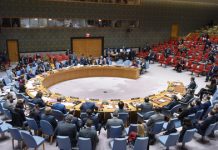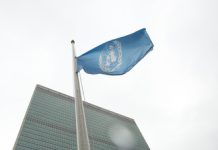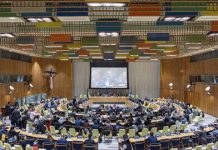The projection is below the 2.5 per cent threshold widely viewed as signalling a global recession.
It also represents a significant deceleration compared to average annual growth rates prior to the COVID-19 pandemic when global growth was already subdued.
Threats and volatility
The report cited mounting threats including trade policy shocks, financial volatility and a surge in uncertainty.
Rising trade tensions are impacting global trade, and recent tariff measures are disrupting supply chains and undermining predictability.
“Trade policy uncertainty is at a historical high,” it said, “and this is already translating into delayed investment decisions and reduced hiring.”
Every country affected
The slowdown will affect all nations and UNCTAD expressed continued concern for developing countries, particularly the most vulnerable economies.
Many low-income countries face a “perfect storm” of worsening external financial conditions, unsustainable debt and weakening domestic growth, the agency said.
In terms of regional developments, UNCTAD expects a sharp deceleration of the United States economy to 1 per cent growth in 2025, largely due to heightened policy uncertainty compounded by recently announced trade measures. Canada is also on track to experience a significant deceleration, with growth forecast to 0.7 per cent.
“Overall, the risk of a recession materializing later this year in the Northern America region has increased considerably,” the report said.
Mixed pictures for Asia, Africa
Growth in South Asia region will expand by 5.6 per cent “as declining inflation opens the way for monetary loosening across most of the region.” However, food price volatility will remain a risk and complexities around debt will continue to affect economies such as Bangladesh, Pakistan and Sri Lanka.
Meanwhile, growth in Africa is expected to pick up to 3.6 per cent this year, though its three largest economies – South Africa, Nigeria and Egypt, who together account for nearly half of the region’s economic output – show a mixed picture of recovery and challenges.
“Africa is on the frontline of exposure to cascading crises. Subdued growth across the continent is insufficient to create enough good jobs, especially for its youth,” the report said.
South-South trade
The outlook is not all gloomy as the report points to the growth of trade among developing countries – known as South-South trade – as a source of resilience.
It currently accounts for roughly one third of global trade and offers opportunities for many developing countries.
In the face of rising trade tensions and a slowdown in growth, UNCTAD calls for dialogue and negotiation alongside stronger regional and global policy coordination.
“Coordinated action will be essential to restore confidence and keep development on track,” the report said.
Source of original article: United Nations (news.un.org). Photo credit: UN. The content of this article does not necessarily reflect the views or opinion of Global Diaspora News (www.GlobalDiasporaNews.com).
To submit your press release: (https://www.GlobalDiasporaNews.com/pr).
To advertise on Global Diaspora News: (www.GlobalDiasporaNews.com/ads).
Sign up to Global Diaspora News newsletter (https://www.GlobalDiasporaNews.com/newsletter/) to start receiving updates and opportunities directly in your email inbox for free.





























